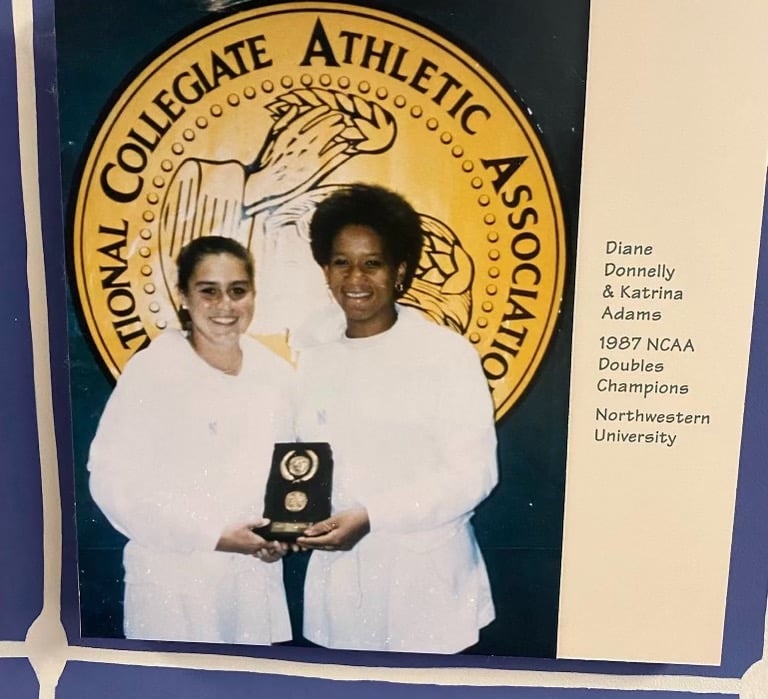Q&A: Former Northwestern tennis player, USTA chair Katrina Adams talks Title IX and NU athletics
Photo courtesy of Katrina Adams
Katrina Adams and Diane Donnelly Stone after winning 1987 NCAA Doubles Championship. Adams said the event did not involve much fanfare, and she only found the photo in recent years.
October 27, 2022
Katrina Adams is no stranger to breaking barriers.
One of the first Northwestern women’s tennis players to earn All-American and All-Big Ten honors, she was also the first Black leader of the U.S. Tennis Association, as well as the first former professional tennis player to hold the position. She is still often the only woman or person of color in the room in advisory and leadership roles.
Adams first began playing tennis in 1975 — just three years after Title IX became law. The legislation has shaped her life, from allowing her the opportunity to play college athletics to paving the way for her professional tennis career. The Daily spoke with Adams about the ground-breaking nature of Title IX, her athletic experiences at NU, her leadership in the world of sports and more.
This interview has been lightly edited for brevity and clarity.
The Daily: At what point did you learn about Title IX and the impact it had on your athletic career?
Adams: While I was on the (Women’s Tennis Association) Tour (and) reflecting back, I started to learn about Title IX and the honor I had of getting a college scholarship. I didn’t focus on it or appreciate it until I retired from the tour and started working with younger players and (encouraged) them to work their hardest to earn a college scholarship. Then I could talk about Title IX — the importance of it, how privileged they were to have this opportunity.
On the flip side, as I started to learn about it, I got frustrated in knowing that we didn’t always have equal opportunities. We are still fighting for equality and parity in many different ways.
The Daily: When you arrived at NU, what was your experience like? What were the resources like?
Adams: We had our outdoor facility on Sheridan Road. We never had an indoor facility. (Both the men’s and women’s teams) traveled to local clubs to practice.
I could have gone to other universities with great tennis facilities, but Northwestern was where I wanted to be. It was a great opportunity for education. The facilities were limited for tennis, so that was frustrating, but we didn’t have the best facilities for any sport. Basketball had their arena and football had a stadium, but a lot of the other sports struggled with what we had.
The Daily: Were the resources you had as a women’s tennis player equivalent to what revenue sports had?
Adams: Definitely not. I don’t even know if we could use the weight room. (It was) limited to football and basketball. We had physical therapy trainers, but not fitness trainers or nutritionists or things of that nature for our teams like football and basketball did. There was definitely a disparity in access.
But when you’re young, you don’t know what you don’t know. A lot (of) these things (involve) looking back and saying “Why didn’t we have this?” or “Why couldn’t we have that?”
The Daily: Did you feel playing in the NCAA Tournament was treated with the excitement and celebration it deserved?
Adams: There was not a lot of fanfare, particularly the year we won, which was at UCLA. I don’t recall there being any signage that said ‘NCAA Championships’ or banners. I don’t recall there being a lot of people in the stands. I barely got a photo. I just found the photo recently of Diane (Donnelly Stone). There were no photographers, no reporters — nothing like that.
The Daily: You’ve held leadership roles and served on numerous boards. How often have you found yourself to be the only woman in the room?
Adams: Quite often. I wrote a book (called) “Own the Arena: Getting Ahead, Making a Difference, and Succeeding as the Only One.” “The only one” references being the only woman or the only person of color in the room. I credit my confidence from my sport to empower me in many of these situations. I can also credit NU for always stressing preparation, to help me be prepared to go into meetings or arenas and be confident in my knowledge.
The Daily: Have you noticed a positive change in recent years in getting more women and people of color in these rooms with you?
Adams: There’s definitely been a push in the last couple of years to be more inclusive. That’s a political push, which is unfortunate. It should be a natural push.
I want to get (others) to join me on these boards and leadership roles as (an) obligation. Men are constantly doing that for one another. If we as women are not nudging someone to join us in these spaces, then shame on us.
The Daily: It’s been 50 years since Title IX has passed, but inequities still persist in leadership roles in the sports world and treatment of college athletes. How can things improve?
Adams: We need more women in leadership roles in colleges, in athletic director positions, in the boardroom, that are making decisions and fighting for equality and parity in women’s sports.
You constantly have men who are making these decisions. They’re not looking at female sports. They don’t value what we bring to the table. They don’t recognize that we add value to the sports at universities. We’re not often included in television packages or marketing. We’re an afterthought. Until we have women in the rooms that are pushing for these actions, we’ll always be behind.
Email: cvarnes@u.northwestern.edu
Twitter: @charvarnes11
Related Stories:
— Former Northwestern tennis player Katrina Adams rises to top of U.S.T.A.
— Northwestern student-athletes attend Big Ten Women’s Leadership Summit
— Women’s Tennis: Northwestern shows out on home court at Wildcat Invite



